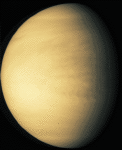
|
Venus is equated with the Roman goddess of love and beauty. Later,
under Greek influence, she was equated with Aphrodite and assumed many
of her aspects.
Venus is the daughter of Jupiter, and some of her lovers include Mars and Vulcan. Venus' importance rose, and that of her cult, through the influence of several Roman political leaders. The dictator Sulla made her his patroness, and both Julius Caesar and the emperor Augustus named her the ancestor of their (Julian) family: the 'gens Julia' was Aeneas, son of Venus and the mortal Anchises. Ceasar introduced the cult of Venus Genetrix, the goddess of motherhood and marriage, and built a temple for her in 46 BC. She was also honored in the temple of Mars Ultor. The last great temple of Venus was built by the emperor Hadrianus near the Colusseum in 135 AD. Roman statues and portraits of Venus are usually identical to the Greek representations of Aphrodite. |
|
Venus is the second planet from the Sun and the sixth
largest. Venus' orbit is the most nearly circular of that of any planet,
with an eccentricity of less than 1%.
orbit: 108,200,000 km (0.72 AU) from Sun diameter: 12,103.6 km mass: 4.869e24 kgSince Venus is the goddess of love and beauty. The planet is so named probably because it is the brightest of the planets known to the ancients. (With a few exceptions, the surface features on Venus are named for female figures.) Venus has been known since prehistoric times. It is the brightest object in the sky except for the Sun and the Moon. Like Mercury, it was popularly thought to be two separate bodies: Eosphorus as the morning star and Hesperus as the evening star, but the Greek astronomers knew better. Since Venus is an inferior planet, it shows phases when viewed with a telescope from the perspective of Earth. Galileo's observation of this phenomenon was important evidence in favor of Copernicus's heliocentric theory of the solar system. Venus is usually visible with the naked eye. Sometimes (inaccurately) refered to as the "morning star" or the "evening star", it is by far the brightest "star" in the sky. Venus is called the "Jewel of the Sky." It is the hottest planet because of a greenhouse effect. Heat cannot escape the sulfuric acid clouds. |